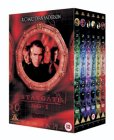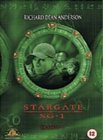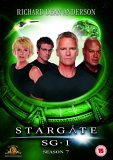Commencing 2 years after the events of the feature film, Stargate SG1 chronicles the adventures of the SG1 team. The team itself consists of over two dozen teams from Earth who explore the galaxy and defend Earth against any alien threats. Featuring some of the same characters from the film, Stargate SG-1 provides plenty more stories and adventures for us to enjoy.
 Stargate SG-1: Season 4
| DVD | (31/03/2003
from £N/A
| Saving you £N/A (N/A%)
| RRP
Stargate SG-1: Season 4
| DVD | (31/03/2003
from £N/A
| Saving you £N/A (N/A%)
| RRP It wasn't until the beginning of Stargate SG-1's fourth season that fans knew to take the Replicator threat seriously. The spidery nasties had only seemed like one of many new enemies introduced in previous years. But when the one seemingly omnipotent backbone of the galaxy was asking Earth for help, clearly we were in real trouble! In fact, the team's list of enemies expanded and got far more complicated this year. Proving without a shadow of a doubt that this is science fiction, the Russians reveal they have their own Stargate program and ask the Americans for help. This twist allows for exploration of all the political machinations occurring behind the scenes of the SG-C, all of which appear to stem from the embittered Senator Kinsey (Ronny Cox). There were quite a few Earth-based stories in the year, but not all the new enemies were originally local. Willie Garson comically guest-starred as Martin, a geekily suspicious guy with too much knowledge of the Stargate. More sinister was an old flame of Daniel's turning into something far more painful than an old wound (thanks to an ancient Egyptian curse). Thankfully, the writers hadn't forgotten the importance of one-off storylines too. In "Upgrades" the team learns a lesson in abuse of power. In "The Other Side" (featuring DS9's Rene Auberjonois) they learn about blind trust. In "Scorched Earth" a dangerous claim for a planet's ownership means they learn to value Daniel's contribution to the group dynamic. If only this last lesson were learned better, season 5 might not have ended up as muddled as it did. --Paul Tonks
 Stargate SG-1: Season 2
| DVD | (27/01/2003
from £N/A
| Saving you £N/A (N/A%)
| RRP
Stargate SG-1: Season 2
| DVD | (27/01/2003
from £N/A
| Saving you £N/A (N/A%)
| RRP The success of the first year meant that Stargate SG-1's second series could afford to spread its wings. In only the second episode, Carter is temporarily possessed by a good Goa'uld. This immediately allowed for both any amount of quick fix inside knowledge as well as story off-shoots, now that the show was bent on franchise longevity. There appeared to be information overload (splinter group Tok'ra, Earth's second Gate, Machello, endless Apophis encounters), as the finely interwoven threads of alien histories and inter-relationships were developed. But thankfully, SG-1 never lost sight of the need for great individual stories. There was a planet of Native American Indians; a planet on the edge of a Black Hole; a planet of aliens sensitive to sound. Even a planet run by Dwight Schultz! Better still, they found time to have fun with their universe, too. "1969" remains one of the best comic romps the series has enjoyed, and is a near-perfect self-contained time-travel story to boot. The team of actors had obviously bonded early on in the first year. It may be a bit of a military faux pas that there is only ever four of them leading every major explorative expedition, but the limited number of principals is actually something else the show has always had in its favour, allowing quality screen time to be spent on each of them from the outset (although Richard Dean Anderson would probably rather not have spent an entire episode impaled by a spike). --Paul Tonks
![Stargate SG-1: Season 1 [1997]](/pictures/1029243.jpg) Stargate SG-1: Season 1 [1997]
| DVD | (21/10/2002
from £N/A
| Saving you £N/A (N/A%)
| RRP
Stargate SG-1: Season 1 [1997]
| DVD | (21/10/2002
from £N/A
| Saving you £N/A (N/A%)
| RRP Like the very best of SF TV, Stargate SG-1 began very simply. Of course it had the benefit of a movie preceding it--in which the alternate universe, its rules and its characters were largely established--so this premiere season was therefore able to concentrate on good storytelling. In 1997 not every new show was obsessed with securing a syndication-guaranteed franchise (same goes for Buffy debuting the same year), instead one-off episodes were the way of things, exploring interesting scenarios and conundrums. Naturally there were allusions to the feature film, but most were subtle and inspired. For example, a trip to retrieve the trapped professor who'd worked on the Gate decades ago was an unusual way of tying up loose ends. Some groundwork was laid for continuation should the show be renewed into an ongoing series. Knowing that these elements were pure wishful thinking at the time makes the tapestry of System Lords and the interlinks with our history and mythology all the more enjoyable in revisiting the show from its beginnings. With Richard Dean Anderson, leading the team in a far more charismatic and empathetic way than Kurt Russell in the movie, the series also benefited from some spot-on casting that instantly won audiences over. Special effects and use of studio sets may be less dazzling in these initial shows, but its solid grounding in old-fashioned SF won for the show a loyal audience. --Paul Tonks
 Stargate SG-1: Season 3
| DVD | (24/02/2003
from £N/A
| Saving you £N/A (N/A%)
| RRP
Stargate SG-1: Season 3
| DVD | (24/02/2003
from £N/A
| Saving you £N/A (N/A%)
| RRP With a well-established framework of back-story and an increasing list of adversaries, the third series of Stargate SG-1 was the place where casual viewers began to fall away. Unless you were taking notes it was becoming ever harder to stay on top of the Goa'uld history and their constant scheming. Fortunately by now a solid fanbase had appeared worldwide--with clubs, conventions and Web sites galore--so the ratings didn't slip even while ancient gods kept appearing and reappearing. Daniel Jackson could always be trusted to illuminate any relevant myth or legend (or find them in five minutes on the internet), while Carter's memory download from last year supplied the necessary ties with the rebellious Tok'ra. Away from the story arc the show's all-important stand-alone tales gave some thorny old subjects a new SF spin, including organised religion, the use of children in the passing on of knowledge, and leading an alternative life. O'Neill's sarcastic wit went into overdrive this year and Teal'c could be relied upon for a sneer or fish-out-of-water joke. Further comic relief came from Sam "Flash Gordon" Jones and Dom DeLuise, but perhaps the funniest thing of all was the wig Carter would apparently be wearing in an alternate universe. --Paul Tonks
 Stargate SG-1: Season 5
| DVD | (28/04/2003
from £25.53
| Saving you £34.46 (134.98%)
| RRP
Stargate SG-1: Season 5
| DVD | (28/04/2003
from £25.53
| Saving you £34.46 (134.98%)
| RRP It now seems clear that year five of Stargate will be remembered as the one where something went awry with Daniel Jackson. Lots of behind-the-scenes rumours fuelled the idea of cast tension, but whatever the problem, his sudden departure from the show was obviously via a hastily contrived scenario. In retrospect, there must have been a problem for some while before the weird penultimate episode ("Meridian"). Michael Shanks looks frequently bored in his rare moments of individual screen time as he infiltrates a Goa'uld meeting and even when making friends with a creature everyone else wants dead. In fact, there's only one point when everyone really seems to be having fun, and that's in the spoof 100th episode "Wormhole X-treme!" Most shows go through a run-around, skin-of-their-teeth period awaiting renewal and it certainly seems to have affected storylines this year. For example, a next generation of younger SG teams is introduced. Replacements? The most unfortunate aspect of things however was that not a single episode managed to stand alone on its own merits. Every single story was dependent on a part of the greater interwoven warring species threads. Some of the one-off tales were terrific in and of themselves, but it was as if the writers fell into the trap of having to refer to as much backstory as possible, perhaps to ensure loose ends could be easily wrapped up? Ultimately none of this mattered since the show went on for quite a while. --Paul Tonks
 Stargate SG-1: Season 6
| DVD | (02/02/2004
from £19.99
| Saving you £40.00 (200.10%)
| RRP
Stargate SG-1: Season 6
| DVD | (02/02/2004
from £19.99
| Saving you £40.00 (200.10%)
| RRP The biggest change for Stargate's sixth season was its move to the Sci-Fi Channel. Financial rescue or genre haven from cancellation? Whatever the behind-the-scenes politics, the departure of Daniel Jackson (actor Michael Shanks) the previous year most certainly contributed to the need to run a tighter ship somewhere. With the addition of his replacement, Jonas Quinn, the new show dynamic (hinted at by the new title theme tune) meant far more convoluted arc-stories and less individual focus. One of very few solo spotlights came from Christopher Judge writing his own show, when "The Changeling" saw Teal'c act out a life as a fireman. One reason for being a fan favourite was its cameo from still-alive-after-all Daniel Jackson. There'd be several more through the year, culminating in a finale that tested how much attention you'd been paying to that all-important back-story. Other kooky cameos included Dean Stockwell in one of the many spotlights on the energy resource n'quadria, Ian Buchanan as one of the devilish Replicators (and hopefully the end of that plotline) and regular spots from John DeLancie, Ronny Cox and Tom McBeath as the Earth-bound series baddies. More pertinently, we also saw Byers from The X-Files (Bruce Harwood) as a scientist involved with the Antarctic Gate. Lest we forget, there are other portals on Earth. Is that an already planned spin-off on the horizon? --Paul Tonks
 Stargate SG-1: Season 7
| DVD | (28/02/2005
from £36.43
| Saving you £23.56 (64.67%)
| RRP
Stargate SG-1: Season 7
| DVD | (28/02/2005
from £36.43
| Saving you £23.56 (64.67%)
| RRP A gradual shift in overall style, character homecomings and departures, and evolving on and off-screen roles for the major players are among the attractions of the complete seventh season of Stargate SG-1. Spread out over five discs, these 21 episodes are ample indication that changes notwithstanding--and admittedly, not all of them are for the better--the series remains arguably the best-made, most compelling sci-fi program on television. Perhaps most noticeable is the reduced role of star Richard Dean Anderson, who opted to limit his number of trips to Vancouver, where Stargate SG-1 is filmed. But that's not a bad thing. The show's ability to poke fun at itself has always been a strong suit, and while Anderson still brings a welcome sense of humor to his portrayal of wiseacre and loose cannon Col. Jack O'Neill, his act is getting a little smug by now. What's more, the other principal cast members have taken up the slack, both behind and in front of the camera: Michael Shanks (Daniel Jackson, who rejoins the cast in episode 1) wrote one episode and co-wrote another; Christopher Judge (Teal'c) wrote one as well; Amanda Tapping (Lt. Col. Samatha Carter) directed episode 19, "Resurrection"; and even Corin Nemec (Jonas Quinn, who appears in just a few episodes) contributed one story. The seventh season also finds the series somewhat more earthbound than in the past; indeed, there are episodes in which the Stargate (the "wormhole" our heroes use to travel to different worlds) doesn't appear at all. On balance, the stories are more personal, and more political--especially the final two, with the newly elected U.S. President (William Devane) struggling to decide the fate of the Stargate program (and, of course, the fate of the entire known universe as well!). And then there's the ultimate villain, Anubis, who makes perennial nemeses the Goa'uld (of which Anubis is one... sort of) look tame. He's a combination of Star Wars' Darth Vader and evil Emperor, but hey, at least these guys borrow from the best. Stargate SG-1's production values remain first-rate. The bonus DVD features are also much better than they once were, with audio commentary (mainly by directors and writers) for every episode, as well as director profiles and "Beyond the Gate" featurettes focusing on individual characters. --Sam Graham
![Stargate-SG 1 Season 8 [2004]](/pictures/1036628.jpg) Stargate-SG 1 Season 8 [2004]
| DVD | (27/02/2006
from £N/A
| Saving you £N/A (N/A%)
| RRP
Stargate-SG 1 Season 8 [2004]
| DVD | (27/02/2006
from £N/A
| Saving you £N/A (N/A%)
| RRP The Stargate is an intergalactic gateway developed by an ancient civilization that links other planets from other solar systems to ours. Boasting incredible special effects sequences rapid-fire pacing and awesome scenes of alien warfare Stargate SG-1 is your gateway to pulse-pounding sci-fi action! All the exciting adventures from the eighth season of the sci-fi series with a plethora of extra features. Episodes Comprise: 1. New Order (Part 1) 2. New Order (Par
This site uses cookies.
More details in our privacy policy